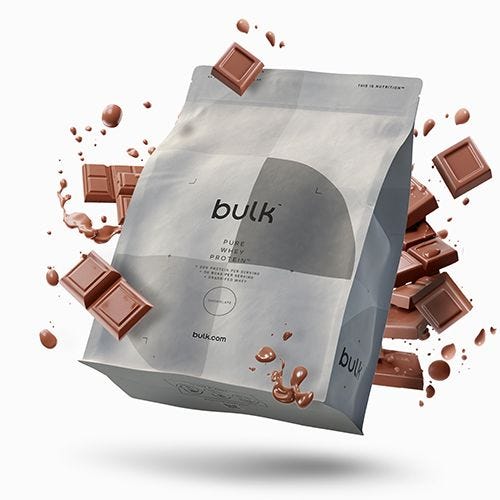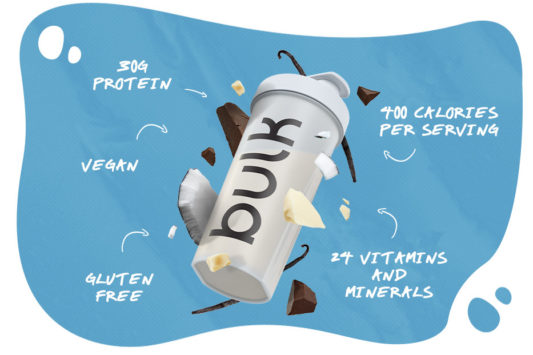Protein is a key macronutrient, and it’s the one many of us focus on if we’ve got a fitness goal in mind. If your goal is to gain muscle, you may be trying to get as much protein as possible into your diet, whether it be through foods like protein powder, meat and tofu. But how much protein can your body absorb?
It’s important to know that there is a limit to how much protein your body can absorb in one meal. This means it might not be beneficial to try and cram five chicken breasts into one mega meal, but rather to space out your protein intake throughout the day. Let’s explore why that is, and how much protein your body can really absorb and utilise to support your goals.
How much protein can you absorb?
Quite a lot. According to a 2013 study in the Journal of Physiology, muscle protein synthesis is maximised at a dose of about 20-25 grams protein in one sitting. Here, ‘one sitting’ refers to a time period of 1-2 hours (1).
This conclusion has been supported by several more recent papers, including a paper by the International Society of Sports Nutrition (2). Any more protein than this is still absorbed, but takes more time to digest, and will likely be involved in other metabolic processes such as energy production or fat storage instead of muscle growth. In other words, not all of it goes straight to your biceps.
The amount of protein you absorb over a period of time depends on several factors, mainly the type and quality of the protein ingested. For instance, fast-digesting proteins like whey protein can be absorbed at a rate of around 10 grams per hour, while cooked egg protein absorbs much slower, at a rate of about 3 grams per hour.
Therefore, consuming 20-25 grams of a high-quality, fast-absorbing protein (like whey) in one meal will result in a high proportion of that protein being absorbed and utilised. Meanwhile, slower-digesting foods like eggs are less effective when consumed in large portions.
This doesn’t mean that you shouldn’t be eating eggs and other tasty wholefood sources, far from it. Getting a varied intake of protein from different sources is the best way to go about your high-protein diet. For example, eggs or egg whites are a great choice for breakfast because of their slow absorption, while a fast-absorbing protein like whey is a good choice for your post-workout hit.

How much protein can your body absorb after a workout?
There’s a lot of discussion about whether you should consume protein within a specific time window after a workout, and how much protein you should be consuming post-workout.
The International Society of Sports Nutrition advises to consume protein within three hours post-workout, particularly essential amino acids. Whey protein, by the way, contains all nine of these essential amino acids.
As for the amount of protein? As mentioned earlier, your body will benefit most from consuming 20-25 grams of protein in one sitting in terms of muscle gain, regardless of whether it’s post-workout or not. Because of this, an ideal post-workout meal should include between 20 and 25 grams of high-quality protein, containing all nine essential amino acids. This can be done via whole foods such as chicken and tofu, but the most convenient way is to use protein shakes. Wholefoods are the ideal, protein shakes are the fillers.
It also might be useful to consume your protein alongside a source of fast-acting carbohydrate, such as maltodextrin. One study found that consuming leucine (a type of BCAA) alongside these fast-acting carbohydrates maximised the potential for muscle protein synthesis post-workout, resulting in greater muscle hypertrophy and strength (4). Fast-acting carbs include sports drinks, fruits like bananas, or simple carbs like rice cakes.
The general consensus seems to be that the timing of protein consumption post-workout is less important than the total amount of protein consumed throughout the day (at regular intervals). That being said, if you can get one of your meals in soon after a workout, it definitely wouldn’t be a bad thing.
Related Products
How much protein can your body absorb per day?
There isn’t necessarily a limit on how much protein your body can absorb per day, but rather a limit on how that protein will be used for each function within your body. As mentioned, muscle protein synthesis is maximised when you consume 20-25 grams protein in a meal. After that, excess protein will be used for a variety of other functions, which include energy production and fat storage.
What is the recommended protein intake per day?
The typical recommended protein intake given by most nutritional organisations and the government guidelines is 0.8 grams protein per kilogram of body weight per day. But this varies massively from person to person and is determined by sex, weight, lifestyle and fitness goals.
The reality is that 0.8 grams per kg is often not enough, especially if you’re looking to grow muscle. To back this up, one study suggests that those with the goal of maximising muscle mass and strength gains should be consuming 1.6 grams of protein per kilogram of body weight per day, at a minimum (5).
Similarly, the International Society of Sports Nutrition recommends consuming between 1 and 1.6 grams protein per kilogram of body weight, spread across four meals throughout the day (6). Remember, everyone’s requirements being different, but as a guideline, this is what the ISSN recommends for physically active people.
There isn’t even a definitive upper limit. While you certainly can consume too much protein, we don’t know for sure what the ideal upper limit is. Researchers are still working on that.
Should you spread your protein consumption throughout the day?
The short answer? Yes.
As we’ve discussed, 20-25 grams is an optimal amount of protein to be consumed during a meal. This will maximise the possibility for muscle protein synthesis. Any more protein consumed after that in the same timeframe will either be oxidised for energy, or used in other metabolic processes such as fat storage.
Multiple reviews suggest eating between 0.25-0.4 grams of protein per kilogram of body weight per meal, around four times a day (every 3-4 hours). This appears to be the most effective way to maximise muscle protein synthesis and is associated with improved body composition and athletic performance outcomes.
Related articles
Eager to learn more? We believe that every person, with support, has the right to transform their lives through fitness. That’s why we’ve put together hundreds of articles with expert advice, all to help you on your fitness journey. From the best supplements for muscle growth to how much protein your body can absorb, check out our relevant articles below:
Alcohol and muscle growth Whey isolate vs whey protein
Build core strength The benefits of liquid egg whites
Protein shakes for weight loss What is Clear Whey Isolate?
Protein shakes with milk or water? Protein shake: before or after workout?
Best supplements for muscle growth When to drink protein shakes



















